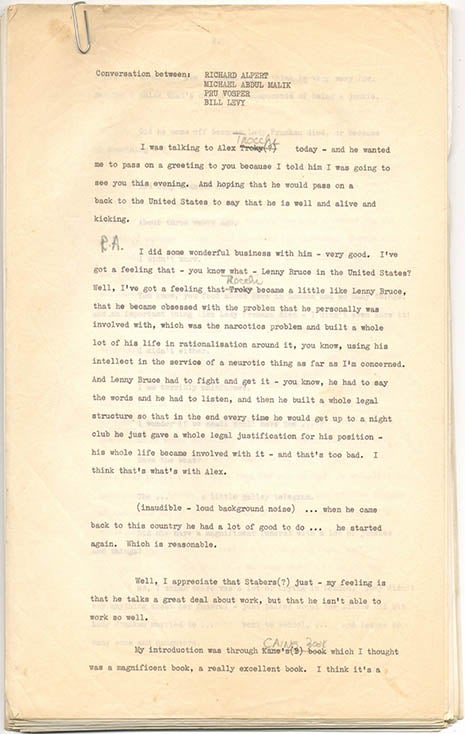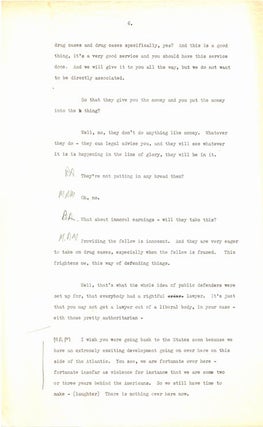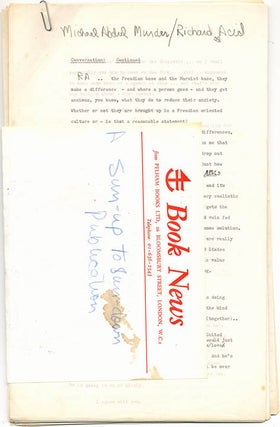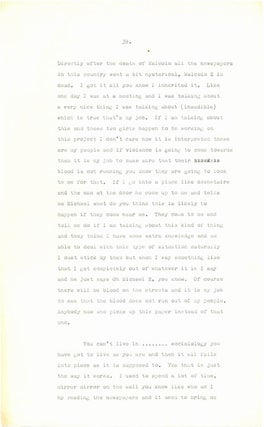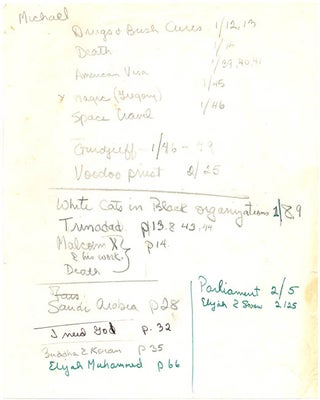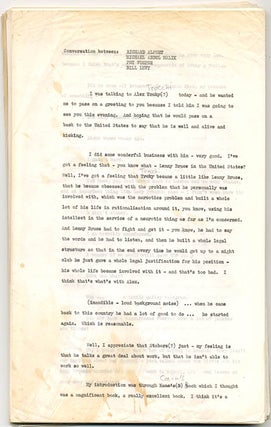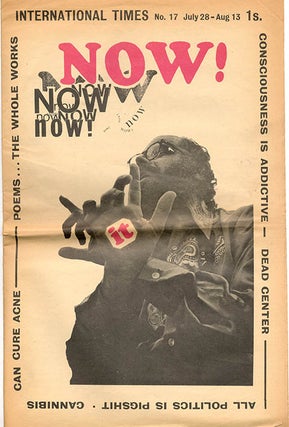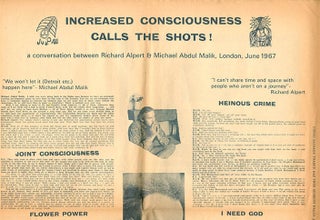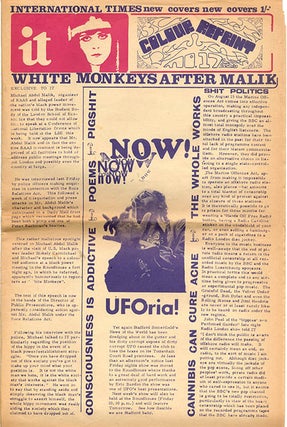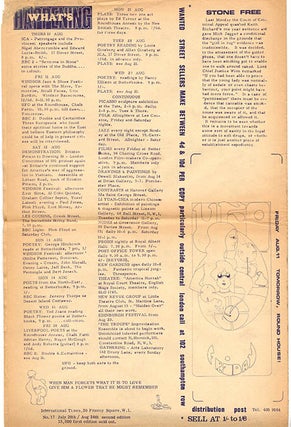48.
TRANSCRIPT. Original typed transcript of a conversation between Richard Alpert, Michael Abdul Malik, Pru Vosper and Bill Levy recorded in London in early June 1967.
Foolscap sheets, 112pp. (+ carbon copy, seven pages of which are included in the top copy in place of missing pp. 28-34).
The meeting was recorded at Michael Abdul Malik’s home, probably the flat in Compayne Gardens, West Hampstead previously occupied by the playwright Bernard Kops. The exact date is unknown, and it’s unclear who instigated the meeting, though it seems likely that Bill Levy, who recorded it, may have wanted to bring Malik together with Richard Alpert for a possible feature in International Times (brief extracts from the conversation were published in International Times #17, and, later, in “Souvenir Programme for the Official Lynching of Michael Abdul Malik” [item #60]). It’s also unclear who Pru Vosper is (or was), as no mention of her can be found anywhere by this cataloguer; the only clues lie in her contributions to the conversation, during which she talks about her recent switch of guru from RD Laing to Ravi Shankar. Similarly unclear is the reason for Alpert’s presence in London. It seems possible that he was en route to India (where he was to meet Neem Karoli Baba, under whose guidance he received the name Baba Ram Dass), and it’s known that while in London he visited Michael Hollingshead in Wormwood Scrubs, providing him with some LSD infused grapes.
Whatever the circumstances, the small gathering produced a lengthy, discursive, sometimes incoherent conversation, what would then have been termed a ‘rap’ (peppered with period lexicon such as “I dig exactly that trip” and “he is one hell of a groovy cat”). Although four-way, the conversation is dominated by the dialogue between Malik and Alpert, who exchange views on a wide range of topics, from the role of “white cats” in a “black organisation”, Malcolm X (“who was really a very beautiful guy” [Malik]), power and “joint consciousness” (Alpert), to magic and space travel (“if you really want to be in America why can’t you just transfer yourself over there and be back here like in a split second?” [Malik]).
It begins with Alpert comparing Malik’s friend, Alexander Trocchi, with Lenny Bruce, in “that he became obsessed with the problem that he personally was involved with… the narcotics problem… using his intellect in the service of a neurotic thing”, and mention of the recent death of Lady Frankau (the “society doctor” who supplied heroin to Trocchi and many others). This leads on to the subject of Defence, “an organisation which is set up specifically to deal with the black minority” (a forerunner of Release), and the wider issues of “racialism” in Britain. Alpert remarks that he doesn’t “get involved in causes most times… they’re a drag. Because they are like narrow consciousnesses”, which Malik agrees with and mentions knowing “a little guy called Hoppy who is so beautiful, he’s just got nine months in gaol for drugs, you know.” Malik then recounts how “we’ve been smoking weed since we were two”, and describes the bush cures his parents used in Trinidad.
Talk of Malcolm X leads Alpert on to mention Emmett Grogan and the Diggers, and Grogan’s attempts to turn on Puerto Ricans in New York by handing out free LSD, which Malik connects to his attempts to “really turn on this complete town. A town with 120,000 lost souls inside of it” (probably a reference to Reading and his Hinterland Project).
Following a mention of his article in International Times #14.5 (item #74), Malik talks at some length about Islam, “one of the most swinging religions”, and Alpert asks him “Do you need God or do you need the book?” (the Koran), and Malik replies “I need the book and God”, later adding that “Malcolm X introduced me to it - I can’t say that I wasn’t on the swinging scene because I used to rob the occasional bank and rob the occasional Post Office and have a number of ladies on the street hustling… And since Malcolm came and showed me this book I just found something else which it is I groove along with better.”
Malik tells of his problems with acquiring an American visa, leading Alpert on to Timothy Leary’s persistent legal issues and failed attempt to visit Canada, and the establishment’s fear of him “Because… what Tim represents… is chemically altering the way a person sees the world.”
Pru Vosper enters the conversation at this point (while Malik makes a pot of tea), and discusses with Alpert a meeting she witnessed between RD Laing and Ravi Shankar in which Shankar became “terribly upset and said, Ronnie is a sick man”, Vosper adding: “he does drink two bottles of whisky a day…”.
When Malik returns with the tea, Alpert talks about Hopi Indian culture at some length, and his visit to New Mexico - “Allen Ginsberg was there, Emmett Grogan was there” - describing how the Hopis “were bugged because the hippies had been there and in the course of one weekend had made love by the waterfall which is like going against the fertility rite, they had smoked pot in a house which was upsetting… and had taught one of the children the Hare Krishna chant.” This leads him to mention Buckminster Fuller, his idea of a “world citizenship island off the coast of Greece”, and geodesic domes, Bill Levy commenting that there are none in England “that I know of”.
Other figures discussed include the futurist, Herman Khan, founder of the Hudson Institute and the inspiration for Dr. Strangelove, and, at some length, Elijah Muhammad, leader of the Nation of Islam, Malcolm X’s teacher and, Malik states, “my present teacher” (Malik’s girlfriend, Nancy Bacal, claimed that Michael’s Islam name was given to him by Elijah Muhammad during a phone call). Earlier in the conversation, Malik refers to Muhammad’s use of “the word black - we never used that word before. It’s not so long that wasn’t the used word by black people. They probably like coloured - one of the type of strange words, you know. And if you tell them the word black they will punch you in your eye, you know, they really would…. That’s not so long ago. They have hidden behind so many other words.”
The conversation draws to a close with Malik in ramble mode, talking inter alia about his self-image, technique for responding to journalists, and his organisation RAAS (though unnamed). Altogether, the transcript, largely unpublished and unseen for many years, reveals fresh insights into Michael Abdul Malik’s beliefs, adds further biographical details about his life, and captures his distinctive voice in a uniquely unmediated way.
Light edge-creasing and age-toning to some pages; divided into two parts, each gathered by a paper clip; amendments in pencil, probably in Bill Levy’s hand, with initials added throughout to aid identification of the speakers; accompanied by a sheet with Levy’s notes made in preparation for the publication of extracts in International Times; together with two copies (first issue and reprint) of International Times #17, both centrally folded and a little worn.
Provenance: Bill Levy.
 Back to top
Back to top

